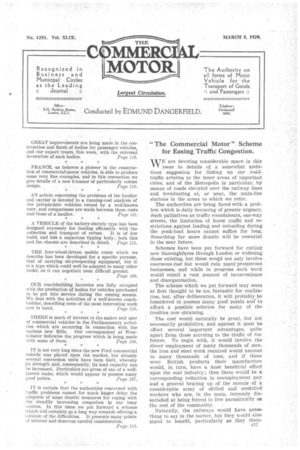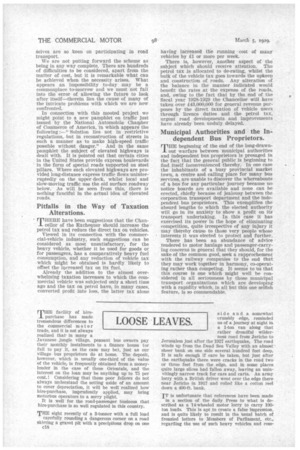"The Commercial Motor "_ Scheme for Easing Traffic Congestion.
Page 39

Page 40

If you've noticed an error in this article please click here to report it so we can fix it.
WE are devoting considerable space in this issue to details of a somewhat ambitioui suggestion for linking up our roadtraffic arteries to the inner areas of important cities, and of the Metropolis in particular, by means of roads elevated over the railway lines and terminating at, or near, the main-line stations in the areas to which we refer.
The authorities are being faced with a problem which is daily becoming of greater urgency. Such palliatives as traffic roundabouts, one-way streets, the limitation of horse traffic and re, strictions against loading and unloading during the peak-load hours cannot suffice for long. Something far more drastic will be essential in the near future.
Schemes have been put forward for cuttink new thoroughfares through London or widening those existing, but these would not only involve enormous cost but would ruin many prosperous, businesses, and while in progress such work would entail a vast amount of inconvenience and disorganization, The scheme which we put forward may seem at fiist thought to be too fantastic for realization, but, after deliberation, it will probably be Considered to possess many good minis and" to afford a possible solution for many of the troubles now obtaining.
The cost would naturally, be great, but not necessarily prohibitive, and against it must be offset several important advantages, quite apart from those accruing to the thffic of the future. To begin with, it would involve the directemployment of many thousands of men, the iron and steel work required would amount to many thousands of tons, and if these were British products their manufacture would, in turn, have a most beneficial effect Upon the coal industry; then there would be a 'corresponding reduction in unemployment pay and a general bracing up of the morale of a. considerable army of skilled and unskilled workers who are, in the main, intensely dissatisfied at being forced to live parasitically on the rest of the community. Naturally, the railways would have something to say in the matter, but they would also stand to benefit, particularly as they them selves are so keen on participating in road transport.
We are not putting forward the scheme as being in any way complete. There are hundreds of difficulties to be considered, apart from the matter of cost, but it is remarkable what can be achieved when the necessity arises. What appears an impossibility to-day may be a commonplace to-morrow and we must not fall into the error of allowing the future to look after itself—therein lies the cause of many of the intricate problems with which we are now confronted.
In connection with this mooted project we might point to a new pamphlet on traffic just issued by the National Automobile Chamber of Commerce of America, in which appear S the following :—" Solution lies not in restrictive regulations, but in reconstruction of streets in such a manner as to make high-speed traffic possible without danger." And in the same pamphlet the subject of elevated highways is dealt with. It is pointed out that certain cities in the United States provide express boulevards in the form of special roads supported on steel pillars. Where such elevated highways are provided long-distance express traffic flows uninterruptedly on the upper deck, whilst local and slow-moving traffic use the old surface roadway below. As will be seen from this, there is nothing fanciful in the actual idea of elevated roads.
Pitfalls in the Way of Taxation Alterations.
rrHERE have been suggestions that the Chan1cellar of the Exchequer should Increase the petrol tax and reduce the direct tax on vehicles.
Viewed in its connection with the commercial-vehicle industry, such suggestions can be considered as most unsatisfactory, for the heavy vehicle, whether it be used for goods or for passengers, has a comparatively heavy fuel consumption, and any reduction of vehicle tax which might be obtained is hardly likely to offset the increased tax on its fuel.
Already the addition to the almost overwhelming taxation increases to which the commercial vehicle was subjected only a short time ago and the tax on petrol have, in many cases, converted profit into loss, the latter tax alone having increased the running -cost of many vehicles by £1 or more per week.
There is, however, another aspect of the subject which should receive attention. The petrol tax is allocated to de-rating, whilst the bulk of the vehicle tax goes towards the upkeep and construction of roads. Any alteration of the balance in the manner indicated would benefit the rates at the expense of the roads, and, owing to the fact that by the end of the fiscal year 1928-1929 the Chancellor will have taken over £43,000,000 for general revenue pur-poses by the direct taxation of vehicle users through licence duties and the petrol tax, urgent road developments and improvements have already been unduly delayed.
Municipal Authorities and the Independent Bus Proprietors.
rpHE beginning of the end of the long-drawn
out warfare between municipal authorities and independent bus proprietors is presaged in the fact that the general public is beginning to find itself inconvenienced thereby. In one case the inhabitants of a busy provincial market town, a centre and calling place for many bus services, are unable to discover the whereabouts of a bus for any particular journey because no notice boards are available and none can be erected, chiefly because of jealousy between the corporation transport department and the independent bus proprietors. This exemplifies the absurd lengths to which the elected authority will go in its anxiety to show a profit on its transport undertaking. In this case it has exercised its power in the hope of eliminating competition, quite irrespective of any injury it may thereby cause to those very people whose interests it was elected to protect and further.
There has been an abundance of advice tendered to motor haulage and passenger-carrying concerns in general that they should, for the sake of the common good, seek a rapprochement with the railway companies to the end that they may work together in harmony, co-operating rather than competing. It seems to us that this course is one which might well be considered in all seriousness by those municipal transport organizations which are developing with a rapidity which, in all but this one selfish feature, is so commendable.












































































































